NordVPN vs Surfshark: 13 Comparison Tests, 1 Winner (2025)
Both NordVPN and Surfshark are high-quality VPNs often recommended by reviewers — but it can be difficult to pick one if you haven’t tested them yourself. To make it easy for you, I ran extensive tests in 13 different categories to compare how each VPN performs.
After 2 weeks of intense testing, NordVPN proved to be the best in more categories than Surfshark. NordVPN has top speeds for high-bandwidth activities, tons of specialty servers, and excellent security features. It’s also a dependable torrenting, streaming, and gaming VPN.
You can try NordVPN risk-free for 30 days to make sure it’s right for you. If you’re not satisfied with how it works for you, requesting a refund is easy and quick. I was reimbursed within just days after I concluded all my tests and reached out via 24/7 live chat.
Editor’s Note: We value our relationship with our readers, and we strive to earn your trust through transparency and integrity. We are in the same ownership group as some of the industry-leading products reviewed on this site: ExpressVPN, Cyberghost, Private Internet Access, and Intego. However, this does not affect our review process, as we adhere to a strict testing methodology.
No Time? Here’s a 1-Minute Summary
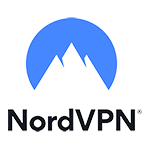 |
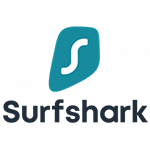 |
|
| Pricing | 2-year + 3 months plan is best value for money at /month | More affordable 2-year + 3 months plan at /month |
| Streaming | SmartPlay feature lets you watch popular streaming services without troubleshooting, but fewer Netflix libraries | Still good and works with more Netflix libraries, but sometimes needs troubleshooting to get other popular services working |
| Servers | 7,287+ servers in 100 countries plus a range of specialty servers | 7,287+ servers in 100 countries but fewer specialty servers |
| Speed | Local servers: 15% decrease from baseline speed
Distant servers: 23% decrease from baseline speed |
Local servers: 18% decrease from baseline speed
Distant servers: 37% decrease from baseline speed |
| Security | Features military-grade encryption, proprietary NordLynx protocol, Meshnet, kill switch, leak protection, and RAM-based servers | Also has military-grade encryption, kill switch, leak protection, and RAM-based servers, but lacking other security features |
| Torrenting | Optimized torrenting servers in 40+ countries and faster downloads | Only has torrenting servers in 30+ countries and slower download speeds |
| China | Doesn’t work in China | Doesn’t work in China |
| Gaming | 34% average increase in latency | Slightly higher 38% average increase in latency |
| Device Compatibility | Broad device compatibility, but app layout is cluttered and only 10 device connections | Broad device compatibility (including Linux app), plus better app interface and unlimited device connections |
| Company Jurisdiction | Headquartered in the privacy-friendly Panama | Headquartered in the Netherlands, in the 9 Eyes Alliance |
| Privacy Policy | Audited no-log policy, but amended its privacy policy to say it will comply with government data requests | Audited no-log policy with unchanged and reliable privacy policy |
| Payment and Refunds | Accepts payments through most major credit cards and cryptocurrency 30-day money-back guarantee |
|
| Customer Support | Fast and helpful 24/7 live chat and email support | Faster responses from 24/7 live chat and email support |
13 Categories of Comparison for NordVPN vs Surfshark
- Pricing — compared monthly and yearly plans to find out what value you get for your money, whether you’re willing to spend or are on a budget.
- Streaming — tested connections to popular platforms like Netflix, Hulu, and BBC iPlayer to see if the VPNs are effective at accessing streaming accounts.
- Servers — evaluated the size and spread of each VPN’s network, including the types of servers available for special functions like torrenting or streaming.
- Speed — measured connection speeds on both local and international servers to see if they’re capable of high-bandwidth activities.
- Security — checked the encryption levels, security protocols, leak protection, and other security measures that can keep you safe online.
- Torrenting — assessed P2P support offered by both VPNs, the availability of designated servers, and their performance.
- China — examined each VPN’s capability in bypassing the Great Firewall and maintaining connectivity to the free internet.
- Gaming — analyzed latency and stability while playing online games to see if the VPNs are suitable.
- Device Compatibility — verified ease of setup and use on various devices, including smartphones and PCs.
- Company Jurisdiction — reviewed both VPNs’ country of origin and privacy practices to get an idea of how your data will be treated.
- Privacy Policy — scoured the fine print to ensure no logging or data retention.
- Payment and Refunds — explored the payment methods available and how easy it is to get a refund.
- Customer Support — interacted with the VPNs’ support channels to judge responsiveness and helpfulness.
1. Pricing — Surfshark Wins With Affordable Plans Long-Term
Surfshark beats NordVPN in pricing since both its 1-year and 2-year plans are cheaper than NordVPN’s.
| NordVPN | Surfshark | |
| Best Deal | a month on a 2-year + 3 months plan | a month on a 2-year + 3 months plan |
| Monthly Plan | 12.99 per month | 12.95 per month |
| 1-Year Plan | 4.99 per month | 3.99 per month |
| 2-Year Plan | a month | a month |
| Free Trial | 7-day free trial on mobile devices | 7-day free trial on Android, iOS, and macOS apps |
| Money-Back Guarantee | 30 days | 30 days |
NordVPN and Surfshark provide various subscription durations. Standard features of NordVPN include malware, tracker, and ad blocker. However, additional features such as a password manager, cloud storage, and next-generation will incur extra costs with the Plus and Complete plans.
Surfshark only includes ad and cookie popup blocker in its standard plan. The malware blocking feature is bundled with its Surfshark One plan which is more expensive and includes an antivirus, webcam protection, breach alerts, and more. The Surfshark One+ plan lets you remove your information from company databases and people search sites.
If you’re wondering if these are good monthly VPNs, know that short-term plans are more expensive than long-term plans. However, Surfshark’s Starter monthly plan is also cheaper at $12.95 a month, compared to NordVPN’s Standard plan worth $12.99 monthly.
One thing I didn’t like about either VPN is that their prices increase dramatically after your initial contract expires. Upon renewal, prices soar to a 100% increase with some Surfshark plans, while NordVPN hikes it up by more than 100%.
If you are price-conscious and don’t want to spend too much on a VPN, consider Surfshark for the first 2 years. After that, you can opt for another VPN as there are many other top choices that cost less.
Pricing Winner: Surfshark
2. Streaming — NordVPN and Surfshark Both Work Great With Tons of Streaming Platforms
Important! The Wizcase team doesn’t condone copyright infringement. Using a VPN to bypass geo-restrictions put in place by streaming services violates pretty much every streaming site’s terms of use agreement. Using a VPN to watch content that isn’t legally licensed in your location could also be considered copyright infringement. The Wizcase team doesn’t condone using a VPN to break any rules, regulations, or laws, so please always be responsible with how you use your VPN.
Both VPNs support UHD streaming on all major services, although neither of them has dedicated servers for streaming. You can protect your online privacy with either VPN without being blocked out of your usual streaming sites.
NordVPN Works With Netflix, Hulu, Amazon Prime Video, Max, and more
During tests by our global team, NordVPN was super reliable for streaming. Its servers worked with tons of globally and locally available streaming sites. Some of the platforms it’s compatible with include:
| Netflix | Hulu | Amazon Prime Video | Max | Disney+ |
| BBC iPlayer | UKTV | ITVx | Apple TV | ESPN |
| Peacock TV | Kodi | YouTube TV | fuboTV | Crunchyroll |
| Vudu | Sling TV | RTÉ Player | Rai Play | DAZN |
| France TV | All 4 | Sky Go | Eurosport | Tubi |
I also found out that NordVPN is one of the best VPNs to watch Netflix. Besides the US servers, its global network works with 13 Netflix libraries around the world including Australia, the UK, Canada, the US, Spain, Turkey, the Netherlands, Japan, and India.

NordVPN also worked flawlessly with Max, Disney+, and Amazon Prime Video with its US servers. This was a relief since you don’t have to keep trying multiple servers to find one that works with the platform you want.
Additionally, NordVPN has SmartPlay, a feature that combines VPN encryption and Smart DNS to reduce proxy errors. SmartPlay is activated automatically when you connect to a NordVPN server.
Surfshark Works With Disney+, DAZN, Crunchyroll, and more
Surfshark is equally good as it worked with every streaming platform that NordVPN did when tested. Some of these include:
| Disney+ | Max | NBC Sports | Yle | Abema TV |
| BBC iPlayer | ITVx | All 4 | Sky Go | UKTV |
| Apple TV | ESPN+ | Paramount+ | Peacock TV | Kodi |
| Youtube TV | fuboTV | Crunchyroll | Vudu | Discovery+ |
| France TV | DAZN | Sling TV | RTÉ Player | Rai Play |
Its only weakness in this area is that you might have to try multiple servers before getting a server that works with your streaming platform. For example, I had to try 3 different servers before a US connection worked with Disney+. If this is too much work, pick NordVPN or another provider — CyberGhost is one of the best with reliable streaming-optimized servers.

However, Surfshark makes up for it because it works with more Netflix regions. Some of the 16 libraries it worked with include the US, UK, Canada, Australia, Japan, France, Germany, India, Italy, Mexico, and The Netherlands.
Multiple Surfshark servers were compatible with 10 play in Australia on the first try but NordVPN struggled with this during tests. While it was possible to access the website on Windows, none of the shows would play with NordVPN, scoring another point for Surfshark.
Surfshark also has a Smart DNS feature, but it only works with US streaming services. While it lets you stream on devices that don’t normally work with VPNs with faster speeds than a regular VPN connection, it doesn’t encrypt your traffic, so online spies and third-parties can still see what you’re doing online.
Both NordVPN and Surfshark work great with streaming platforms, and they both have pros and cons in terms of the services they work with and Smart DNS functionality. For this reason, NordVPN and Surfshark are both winners of the streaming category.
Streaming Winner: Tie
3. Servers — NordVPN Has a Bigger Network Overall
Compared to Surfshark, NordVPN has more servers but in fewer countries. With NordVPN’s larger concentration of servers in each country, you can expect fewer users to connect to the same one. This is good because overcrowding can slow down your internet speed since the server can’t handle all the data traffic efficiently.
| NordVPN | Surfshark | |
| Server Number | 7,287+ | 3,200+ |
| Server Countries | 118 | 100 |
Surfshark’s network covering more countries means it can access content from more geographic locations. This is necessary if you’re from a country that isn’t popular among VPNs and you travel a lot, wanting to access your home content.
Another point worth mentioning is that NordVPN’s network comprises 100% of physical servers while Surfshark has a combination of virtual and physical servers. What this means is that all of NordVPN’s servers are physically located in each country while some of Surfshark’s servers are situated in a different country.
Again, each has its merit; physical servers offer a direct, reliable connection in the actual location they’re based, ensuring more accurate geo-spoofing and often better speeds; virtual servers allow VPNs to provide IP addresses in countries with invasive privacy laws like India, Sri Lanka, Egypt, and Nigeria.
Where the winner can shine in this category is with the type of specialty servers offered. NordVPN has multiple specialty server types with impressive depth, with servers for:
- Dedicated IP addresses — offers a consistent online identity with a personal IP address that belongs solely to you. They prevent triggering security checks when accessing your bank accounts from a different country.
- Double VPN — routes your traffic through two different VPN servers, doubling the encryption for extra security when you’re communicating sensitive information.
- Obfuscation — hides the fact that you’re using a VPN, making it useful in countries and local networks with strict online regulations or firewalls.
- Onion over VPN — combines VPN with the Tor network for extra anonymity.
- Torrenting — optimized for fast and secure peer-to-peer file sharing.
Surfshark has a smaller optimized network but an impressive breadth, with servers for dedicated and static IP addresses and MultiHop (or Double VPN servers). Static IP address servers provide you with a consistent IP address each time you connect. This offers a stable online identity while still keeping your activities private and secure.
By investigating further, I found out that Surfshark has obfuscation features, torrent-optimized servers, and support for Onion over VPN connections. The only difference is that it doesn’t have dedicated servers for these functions.
For this reason, NordVPN wins this category with clearly marked dedicated servers for each function within its network.
Servers Winner: NordVPN
4. Speed — NordVPN Provided Faster Connections Than Surfshark
Each VPN proved to be suitable for high-bandwidth activities but NordVPN was faster than Surfshark on distant servers.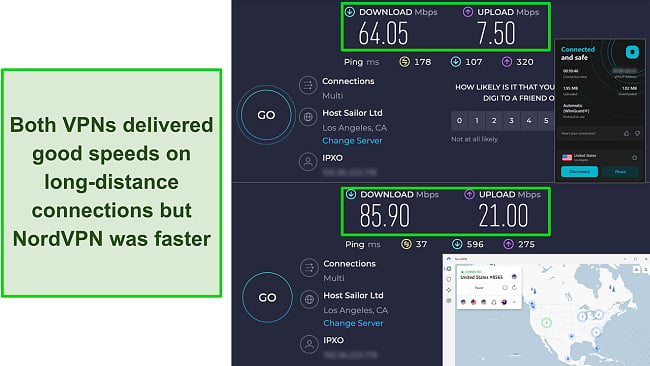
To find out how the VPNs fare, I first did several speed tests without a VPN to get an average baseline speed, which was 117.06Mbps. I then tested the VPNs’ regional and distant servers with multiple devices to compare the difference with my baseline speed.
I used the same MacBook Pro and OpenVPN protocol with every round of tests to keep the test results as accurate as possible. Even though I minimized the variables, remember that no speed test is perfect. Factors like internet connection, server load, location, type of device, and others could change and affect results.
Local Speed Test Results
As I’m based in Malaysia, I selected servers in Singapore, Thailand, and Indonesia to determine the local speed test results. These countries are less than 1,000 miles away from my location. The servers in Singapore had the biggest difference in speeds between NordVPN and Surfshark. NordVPN was generally faster than Surfshark, but only by 9%.
I saw the biggest drop from my baseline speed with the servers in Indonesia but the difference was just about 22% for both VPNs. Even if your baseline speed is lower at around 40Mbps, this level of decline will still allow you to use the internet effectively.
| Singapore | Thailand | Indonesia | |
| NordVPN | 109.32Mbps | 98.99Mbps | 90.21Mbps |
| Surfshark | 100.21Mbps | 97.23Mbps | 90.99Mbps |
Based on these results, I would recommend either VPN’s local servers for high-bandwidth activities like UHD streaming, torrenting, and gaming. During the test, I also made several video calls and neither VPN faltered. There were no audio delays and the video didn’t pixelate on my computer.
Long-Distance Speed Test Results
To test the servers far away, I selected the US, UK, and Australia. While Australia is about 3,000 miles away from me, the US is almost 9,000 miles away, and the UK is slightly nearer at 6,500+ miles. This is significant because the farther a server is from your physical location, the longer it takes for your data to travel, and this affects your connection speed.
Understandably, the Los Angeles server in the US affected my speeds the most but it wasn’t as bad as I thought it’d be. NordVPN was faster than Surfshark by 30% and at an average speed of 87Mbps, it was still fast enough to watch shows in UHD and play fast-paced online games.
| US | UK | Australia | |
| NordVPN | 86.97Mbps | 91.33Mbps | 92.22Mbps |
| Surfshark | 66.45Mbps | 74.74Mbps | 81.65Mbps |
NordVPN is faster than Surfshark for both local and long-distance connections so it’s the winner of this category.
Speed Winner: NordVPN
5. Security — NordVPN Wins With Advanced Features Like 4096 RSA Keys, NordLynx Protocol, Meshnet, and More
Both services have strong core security features with some key differences but NordVPN wins with several advanced features that can keep you safe.
| NordVPN | Surfshark | |
| Encryption | AES-256-GCM, 4096 RSA keys | AES-256 GCM, 2048 RSA keys |
| VPN Protocols | NordLynx, IKEv2, and OpenVPN | WireGuard, IKEv2, and OpenVPN |
| Kill Switch | Available on Windows, macOS, Android, iOS, and Linux. Not available on routers. | Available on Windows, macOS, Android, and iOS |
| DNS and IP Leak Protection | ✔ | ✔ |
| DNS Servers | Runs its own private and encrypted DNS on all servers | Runs its own private and encrypted DNS on all servers |
| Split Tunneling | ✔ | ✔ |
| Malware/Ad Blocker | ✔ | ✔ |
| Double VPN | ✔ | ✔ |
| Onion Over VPN Support | ✔ | ✔ |
| Dedicated IPs | ✔ | ✔ |
| RAM-Only Servers | ✔ | ✔ |
Encryption Standard
Both NordVPN and Surfshark use AES 256-bit encryption, which is a complex cipher that protects your online data — it’s used by all of the top VPNs in 2025. It scrambles your information so well that current supercomputers can’t easily break it, ensuring that your online activities remain private and secure. This is also the encryption standard used by the US government to secure its information.
Additionally, NordVPN uses 4096 RSA keys while Surfshark uses 2048 RSA keys. The RSA encryption key in VPNs acts like a digital handshake that ensures a secure and private connection between you and the websites you visit. NordVPN’s 4096 RSA key is stronger and more secure than Surfshark’s 2048 RSA key.
Encryption Protocol
NordVPN and Surfshark support the following protocols:
- OpenVPN (TCP) (Surfshark and NordVPN) — a reliable protocol often used when stability is prioritized. It’s suitable for general web browsing but can be slower.
- OpenVPN (UDP) (Surfshark and NordVPN) — a faster version of OpenVPN, ideal for activities requiring speed, such as streaming and gaming.
- IKEV2 — secures VPN communication between devices and provides stable connection when a mobile device switches from cellular to WiFi.
- WireGuard (Surfshark) — a modern, lightweight protocol known for high performance and efficiency, good for a variety of online activities.
- NordLynx (NordVPN) — this proprietary protocol combines WireGuard’s strengths and the extra layers of security in DoubleNAT system for better privacy.
Leak Protection
Both Surfshark and NordVPN provide DNS, WebRTC, IPv4, and IPv6 leak protection, but Surfshark doesn’t currently offer IPv6 support — using IPv6 could cause connection interruptions. However, my tests have shown that Surfshark protects against IPv6 leaks.
- DNS leak protection — ensures your website requests (like typing a web address) are kept private, so outsiders can’t see what sites you’re visiting.
- WebRTC leak protection — stops browsers from accidentally revealing your true IP address, even when you’re using a VPN, keeping your location hidden.
- IPv4 leak protection — prevents your primary internet address (IPv4) from being exposed, ensuring your online actions stay anonymous.
- IPv6 leak protection — safeguards your newer internet address (IPv6) from being shown, further hiding your online presence.
These leaks essentially expose your activities or location, defeating a VPN’s purpose. The protections ensure complete privacy by blocking potential leak avenues.
Malware and Ad Blocking
NordVPN has Threat Protection on Mac and Windows apps while Threat Protection Lite is available on Android, iOS, Linux, and browser extensions. Threat Protection is superior to its counterpart as it protects your devices even when you’re not connected to the VPN. For the Threat Protection Lite feature to work, you must be connected to a NordVPN server.
I was happy when NordVPN blocked pop-up ads and refused to load suspicious sites. It also checked my downloaded files for malware.
Surfshark has a similar feature called CleanWeb which also blocked all pop-up and banner ads on major news sites during tests. With fewer elements, the pages even loaded faster. It also has a built-in antivirus program that comes with the Surfshark One plans. This has several scanning options and provides real-time protection against malware.
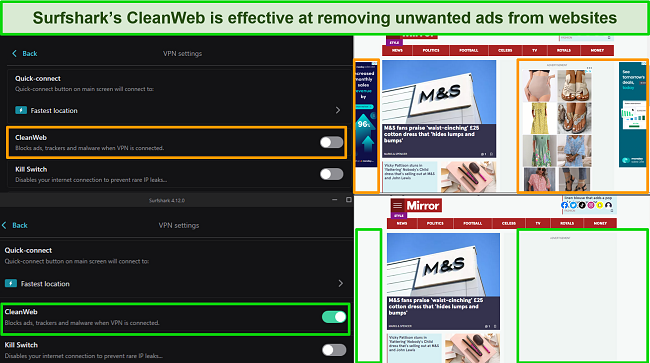
Secure Connection Options
Besides strong encryption, both NordVPN and Surfshark provide double encryption and onion over Tor connections for those who are conscious about their online security.
With double encryption, your data is routed through 2 servers in different locations. While NordVPN only allows you to select the exit server, Surfshark lets you choose both the entry and exit server. I preferred Surfshark’s Dynamic MultiHop function because I could improve the connection speed slightly by picking servers that are nearby.
NordVPN has optimized servers for onion over Tor connections in the Netherlands and Switzerland. As a bonus, NordVPN’s onion over Tor servers can be used without a dedicated Tor browser. All you have to do is connect to a server and then you can use any browser to access the Tor network.
On the other hand, Surfshark supports onion over Tor on all of its servers. You will need a Tor browser to connect to the Tor network, but getting connected is as simple as choosing a server and launching the browser.
Bear in mind that both these options slow down your internet speed considerably as it takes time for your data to be encrypted and travel through multiple servers. I don’t recommend these servers unless you’re especially concerned about your safety.
Split Tunneling
Both VPNs offer this feature, but Surfshark calls it “Bypasser.” Split tunneling lets users choose which apps or websites use the VPN connection and which access the internet directly. This flexibility means you can, for example, watch local content on one browser while using a VPN on another to access foreign content.
NordVPN has split tunneling on Windows, Android, and Android TV apps. Windows connections can be both app-based or inverse while Android connections are only inverse. App-based split tunneling allows you to pick specific apps that use the VPN connection while others bypass it. Inverse split tunneling lets you choose which apps bypass the VPN, with all other apps using the VPN by default.
Surfshark’s Bypasser is available for Windows, Android, and supported routers. The connections can be app or IP/URL based, which means you can specify certain IP addresses or URLs to either use or bypass the VPN connection. So, instead of deciding based on apps, you’re deciding based on the actual destination.
Additional Security Features
Besides these, Surfshark and NordVPN have several other advanced security features to keep you safe online:
NordVPN
- Meshnet — link your devices together to share files, IP addresses, and create LAN parties safely in an encrypted network.
- Dark Web Monitoring — scans the dark web for your personal data and alerts you if it’s found.
- NordPass — stores and organizes your passwords safely in one secure place. Also auto-fills existing credentials and generates strong passwords.
- NordLocker — stores up to 2TB of data in the cloud and protects it from unauthorized access using AES-256, ECC, XChaCha20-Poly1305-IETF, and Argon2id encryption ciphers.
Surfshark
- IP rotator — changes your IP address automatically at intervals to enhance anonymity.
- Antivirus — protects your device from harmful software and malicious threats online.
- GPS spoofer — matches your device’s GPS location to the VPN’s to ensure location consistency.
- Alerts — notifies you if your personal data appears in leaked databases or breaches.
- Incogni — removes your information from company databases and people search sites.
Each VPN has its own strength in terms of security and I recommend Surfshark if you need ultra-secure connections. The IP rotator and GPS spoofer make sure no one can trace your activities or identity. You can also use any of its servers for onion over Tor connections and with Surfshark’s Dynamic MultiHop servers, you can customize your own connections.
But for a regular user, NordVPN is a better choice since its 4096 RSA key is stronger than Surfshark’s. Its proprietary NordLynx protocol also provides better privacy than WireGuard, which Surfshark supports. Plus, you can use Meshnet even if you’re not subscribed to NordVPN.
Security Winner: NordVPN
6. Torrenting — NordVPN Has Specialized P2P Servers in More Locations and Faster Downloads
NordVPN is the winner of the torrenting category as files downloaded faster than Surfshark and its specialty torrent servers are clearly marked.
Both VPNs support torrenting and have optimized servers for P2P file-sharing. Though you can torrent on any server, the specialized network will provide better speeds and more reliable connections. NordVPN has P2P servers in almost 50 countries compared to Surfshark’s 30+ and they’re both compatible with popular torrent sites like qBittorrent and uTorrent.
What I didn’t like is that while NordVPN’s torrenting servers are clearly marked, Surfshark’s are not. When I contacted Surfshark’s customer support via live chat, an agent provided a list. But I later found out that you can just type P2P into the server search bar in the Locations tab to find them.
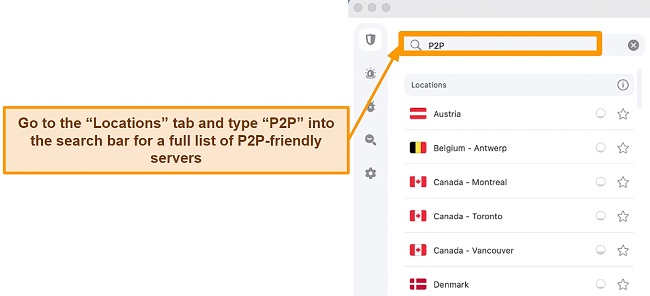
During tests, I downloaded a public domain movie using the closest optimized P2P server for each VPN. With NordVPN, the 1.78Gb file only took me 3 minutes and 48 seconds while Surfshark took a minute more to download.
NordVPN also offers SOCKS5 proxy connections to boost download speeds. Unlike a full VPN, which encrypts all of your data, the SOCKS5 proxy focuses solely on the transfer of data packets, leading to less overhead and faster speeds.
Since NordVPN in general provides better support for torrenters, it is the winner of this category.
Torrenting Winner: NordVPN
7. China — Neither VPN Can Get Past the Great Firewall of China
Neither VPN works in China, so I don’t recommend them for the country. However, you should know that China’s Great Firewall is extremely difficult to avoid — there are only a handful of VPNs that actually work in China.
As both NordVPN and Surfshark have obfuscation features, I was surprised that neither VPN works in China. Obfuscation means that the VPN can disguise your encrypted traffic, making it look like regular HTTP traffic. This should prevent detection by China’s Great Firewall, allowing access to the free internet.
NordVPN has obfuscated servers for this purpose while Surfshark has both NoBorders and Camouflage features. They worked in some countries like the UAE and Turkey and even bypassed the firewalls in schools and workplaces. However, none of them were a match for the Great Firewall of China.
If you often travel there, ExpressVPN is the best VPN to access global content from China with servers in Hong Kong and Macau. Not only are all its servers obfuscated, it’s also one of the fastest I’ve tested. You can connect to a server far away in the US and still get excellent speeds for high-bandwidth activities.
China Winner: Tie
8. Gaming — NordVPN Has Lower Latency Than Surfshark
NordVPN is better than Surfshark with lower latency even on distant servers.
If you’re a gamer, you know how important latency is to win an online game. Latency signifies the time it takes for your instructions to reach the server and for the response (like movements or shooting) to return to your device. When the latency is above 100ms, you’ll notice lags in your game.
VPNs aren’t often used while gaming because they have a bad reputation for increasing latency due to the extra server connections and encryption. However, I was pleasantly surprised by NordVPN’s results when playing League of Legends and Apex Legends:
| Average Ping Without a VPN | Average Local Ping | Average Long-Distance Ping | |
| NordVPN | 35ms | 47ms | 71ms |
| Surfshark | 35ms | 54ms | 121ms |
Even with the long-distance connections, NordVPN maintained speeds within 100ms, making it one of the best VPNs for fast-paced online games like Call of Duty: Warzone.
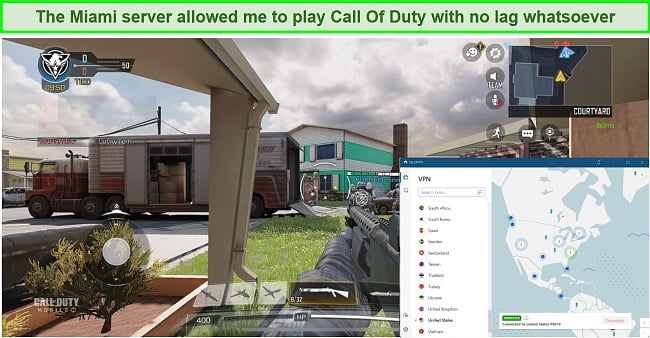
To be fair, Surfshark wasn’t bad either, as long as I used servers within 1,000 miles of my location in Asia. Distant servers had ping up to and above 150ms, making it almost impossible to play Left 4 Dead 2 with frequent lags.
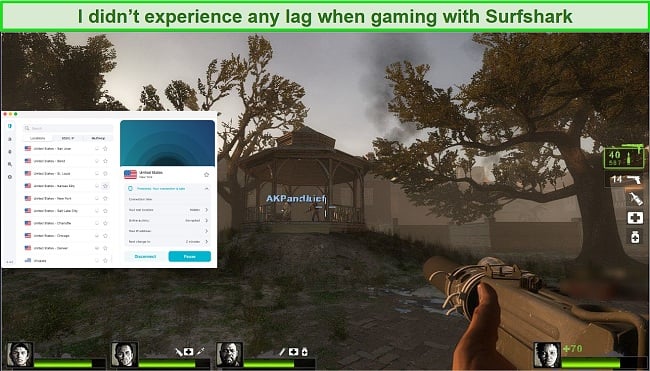
NordVPN and Surfshark are compatible with gaming devices like PlayStation, Xbox, and Nintendo Switch. VPN connections must be set up through a compatible router as no game console supports a native VPN app.
What I really like is that NordVPN has Meshnet to connect to other devices directly and create a private and secure virtual network where you can play games online with your friends. Setting up LAN sessions usually requires configuring your router which is quite technical. Meshnet is easier to use and less time-consuming.
Fortunately, both VPNs protect you against DDoS attacks by masking your real IP address, making it difficult for other gamers to target you. DDoS attacks overwhelm your network with unwanted traffic, causing lag or disconnections. Usually, it’s launched by a vengeful losing opponent.
NordVPN is a great VPN for gamers as it has low latency, supports all gaming devices, and has Meshnet.
Gaming Winner: NordVPN
9. Device Compatibility — Surfshark Wins With App for Linux and unlimited Device Connections
Surfshark has an easy-to-install app for Linux and lets you connect all your devices at once.
I downloaded NordVPN and Surfshark’s apps to my MacBook and Windows computer in less than 6 minutes but it supports many other operating systems. Both NordVPN and Surfshark took about 30 seconds to connect to a server the first time I tried. But after the initial delay, I could connect to a server within 5 seconds every time.
NordVPN works with: Windows, macOS, Linux, Android, iOS, Chrome, Firefox, Edge, Android TV, Fire TV Stick, Smart TVs, Xbox, PlayStation, Nintendo Switch, Raspberry Pi, Chromebook, Chromecast, Kindle Fire, Oculus Quest, routers, and more.
While Surfshark supports a similar range of devices, what really impressed me is that it has an app for Linux users. With NordVPN, you’ll have to install manually using the command line, which is more tedious than just downloading an app.
Surfshark works with: Windows, macOS, Linux, Android, iOS, Chrome, Firefox, Edge, Fire TV, Fire TV Stick, Smart TVs, Xbox, Playstation, Chromecast, Raspberry Pi, Chromebook, Kindle Fire, Oculus Quest, routers, and more.
If you have a device that doesn’t support a VPN app, both NordVPN and Surfshark have router compatibility that lets you set up a VPN connection with your smart TV, game console, and more.
In terms of the app layout, I prefer Surfshark’s since the latest update because it now has all the details I need right on the main screen. NordVPN feels a bit cluttered and I’m not a fan of the map view. With Surfshark on my Windows computer, I can tell which server I’m connected to, which one Surfshark recommends, the protocol I’m using, and more at a glance.
Compared to NordVPN’s 10, Surfshark allows 10 simultaneous device connections. I tried a maximum of 12 devices on Surfshark and all of them worked without glitches. Although you can connect NordVPN to a router to also get unlimited connections, this is a technical process.
Surfshark has a better user interface, an app for Linux, and supports unlimited devices, which is why it wins this category.
Device Compatibility Winner: Surfshark
10. Company Jurisdiction — NordVPN Is Better for Privacy With Headquarters in Panama
Panama, where NordVPN is based, is not part of the 14 Eyes Alliance that practices internet surveillance. Surfshark is based in the Netherlands, a 9 Eyes Alliance member country.
| NordVPN | Surfshark | |
| Company Headquarters | Panama | The Netherlands |
| Outside 5/9/14 Eyes | ✔ | ✘ |
| Warrant Canary | ✔ | ✔ |
A warrant canary is a regularly updated statement verifying that NordVPN and Surfshark have not received any government demands for user data. If the warrant canary disappears from their website or changes, it could indicate they’ve been asked to hand over data. This allows you to take precautions to safeguard your privacy.
NordVPN wins this category because it’s based in Panama, where the government has privacy-friendly laws that don’t include internet surveillance and monitoring.
Company Jurisdiction Winner: NordVPN
11. Privacy Policy — Surshark Has a Slight Edge With an Unchanging and Reliable Policy
Surfshark wins with a dependable privacy policy as NordVPN changed its privacy policy and retracted its previous promise.
| NordVPN | Surfshark | |
| Sign up Information | ||
| Anonymous Payment Methods | Bitcoin, Ethereum, and Ripple | Bitcoin, Ethereum, and Ripple |
| Privacy Policy Audit | Verified by PwC AG Switzerland and Deloitte | Verified by Cure53 AG and Deloitte |
| Server Type | RAM-based | RAM-based |
In terms of privacy, not much differentiates Surfshark from NordVPN. Both VPNs’ no-log claims have been audited and verified by independent third parties. Plus, each uses RAM-based servers that are incapable of storing your data long-term — everything is wiped with every scheduled reboot.
Both VPNs also provide a private mode of payment by accepting cryptocurrencies. If you’re not comfortable sharing your email address at sign-up, create a throwaway account and use cryptocurrency to pay to stay anonymous.
The only problem is that NordVPN changed its privacy policy in 2022 to say that it’ll comply with government data requests despite promising not to do so previously. This sudden change made NordVPN look suspicious. But there’s no real cause for concern since NordVPN uses RAM-based servers, and its no-log policy has been audited.

Surfshark wins this category with a strong privacy policy that’s blemish-free.
Privacy Policy Winner: Surfshark
12. Payments and Refunds — Surfshark Processes Refunds Without Hassle
Surfshark accepts several common payment methods and makes getting a refund easy if you’re not satisfied after 30 days.
| NordVPN | Surfshark | |
| Credit or Debit Cards | Visa, MasterCard, AMEX, Discover and JCB | Visa, MasterCard, AMEX, Discover |
| PayPal | ✔ | ✔ |
| Google Pay | ✔ | ✔ |
| Apple Pay | ✘ | ✔ |
| Amazon Pay | ✘ | ✔ |
| Cryptocurrency | Bitcoin, Ethereum, and Ripple | Bitcoin, Ethereum, and Ripple |
In general, Surfshark offers many more payment options, although NordVPN accepts JCB cards and provides local options that change depending on your geographic location. For instance, I could use GrabPay to pay for NordVPN in Malaysia.
If you’re not happy with your purchase, both VPNs also provide 30-day money-back guarantees. I recommend subscribing through the official VPN websites rather than an app store to be able to claim the guarantee. This is because refunds are subject to the app store’s discretion and policy when you purchase from there.
I bought from the websites and tested the money-back policies by asking for a refund via NordVPN and Surfshark’s 24/7 live chat support. Surfshark processed it immediately and I got my money back in 7 days.
NordVPN’s support staff asked a few questions and tried to convince me to stay. However, the agent sent my request for processing right away after I held firm with my decision to cancel. It only took them 4 days to return the money back to my account.
Surfshark wins this category by a thin margin because they don’t try to convince you to stay after you’ve decided you want to cancel and get your money back.
Payment and Refunds Winner: Surfshark
13. Customer Support — Surfshark Wins Since it Responded to Email Queries Faster
Surfshark wins this category with an efficient and detailed response to my email inquiry. You can also submit a ticket online — NordVPN doesn’t provide this option.
| NordVPN | Surfshark | |
| 24/7 Live Chat | ✔ | ✔ |
| Average Response Time via Live Chat | Within a minute | Within a minute |
| Email Support | ✔ | ✔ |
| Average Response Time via Email | 6 hours | Less than an hour |
| Ticket Support | ✘ | ✔ |
| Phone Support | ✘ | ✘ |
| Online Knowledge Base | ✔ | ✔ |
| Community Forum | r/nordvpn on Reddit | r/surfshark on Reddit |
Though the 2 VPNs provide 24/7 live chat support, I felt both of them were tedious. With NordVPN, I was forced to speak to the chatbot first, which often doesn’t have the answers I’m looking for. You can’t talk to a real agent until you go through the entire line of questioning and when the bot finally agrees to transfer, you’ll have to provide your email address.
With Surfshark, the live chat button is not on every page of its website like NordVPN. You’ll have to scroll all the way to the footer at the bottom and click on the tiny Help Center link. On the next page, you’ll have to scroll down again to find the chat button. After you provide your email address, you’ll be transferred to a ‘virtual Surfshark assistant’ which is also a chatbot.
I managed to speak to a real person and have my issues resolved with both VPNs in the end, but the whole process felt unnecessarily lengthy.
Next, I tested both VPNs’ email support. I was quite impressed that Surfshark responded to me within the hour while NordVPN replied within 6 hours. With many other VPNs I’ve dealt with, the agents didn’t respond until the next day and some even took 4 days. Email replies were thorough with specific answers and links to their relevant online resources.
If you’re like me, you’ll most likely try to troubleshoot issues yourself first. To help, both NordVPN and Surfshark have extensive online tutorials, guides, and even videos. Besides these, Surfshark also has an online Surfschool that teaches you everything about VPNs. It’s super-useful if you’re new to VPNs.
I can’t fault either VPN as far as providing help is concerned since both did solve my issues. But Surfshark wins by a thin margin with an impressively quick response time to email inquiries.
Customer Support Winner: Surfshark
And the Winner Is… NordVPN
NordVPN is better than Surfshark, winning 6 out of 13 categories, with 2 ties.
- Pricing: Surfshark
- Streaming: Tie
- Servers: NordVPN
- Speed: NordVPN
- Security: NordVPN
- Torrenting: NordVPN
- China: Tie
- Gaming: NordVPN
- Device Compatibility: Surfshark
- Company Jurisdiction: NordVPN
- Privacy Policy: Surfshark
- Payment and Refunds: Surfshark
- Customer Support: Surfshark
Surfshark is a great VPN to consider if you want a strong VPN on a budget but remember that the prices increase dramatically after the initial contract comes to an end. Surfshark also has a dependable privacy policy and returns your money without a hassle if you change your mind after purchasing.
NordVPN is the overall winner with better speeds and server functionalities. For a slightly higher price than Surfshark, you’ll also get to use a protocol with better privacy than WireGuard. It’s also located in a privacy-friendly country so you won’t have to worry about your data. Plus, you’ll have 30 days to decide if it’s for you. If not, you can get a refund.
Overall Winner: NordVPN
FAQs: NordVPN vs Surfshark
Is NordVPN better than Surfshark?
Which VPN is faster, NordVPN or Surfshark?
NordVPN has faster speeds in our tests. Surfshark is fast on local servers but has a bigger slowdown in terms of speed and ping over long-distance connections. However, both are still better than most VPNs I’ve tested.
If speed is a major factor for you, I recommend trying ExpressVPN as it’s the fastest VPN I’ve tested. You’ll hardly see a difference in your activities.
Is NordVPN or Surfshark better for streaming on Netflix?
Which VPN is better for Amazon Fire Stick, Apple TV, iPhone, and other devices?
Is NordVPN better for gaming than Surfshark?
Are NordVPN and Surfshark owned by the same company?
The Best VPNs to Try in 2025
Editor's Note: We value our relationship with our readers, and we strive to earn your trust through transparency and integrity. We are in the same ownership group as some of the industry-leading products reviewed on this site: ExpressVPN, Cyberghost, Private Internet Access, and Intego. However, this does not affect our review process, as we adhere to a strict testing methodology.

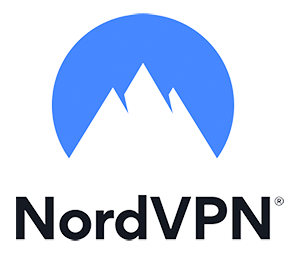
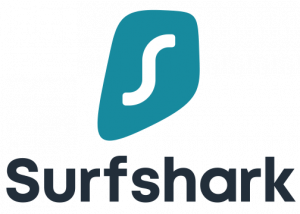




Leave a Comment
Cancel